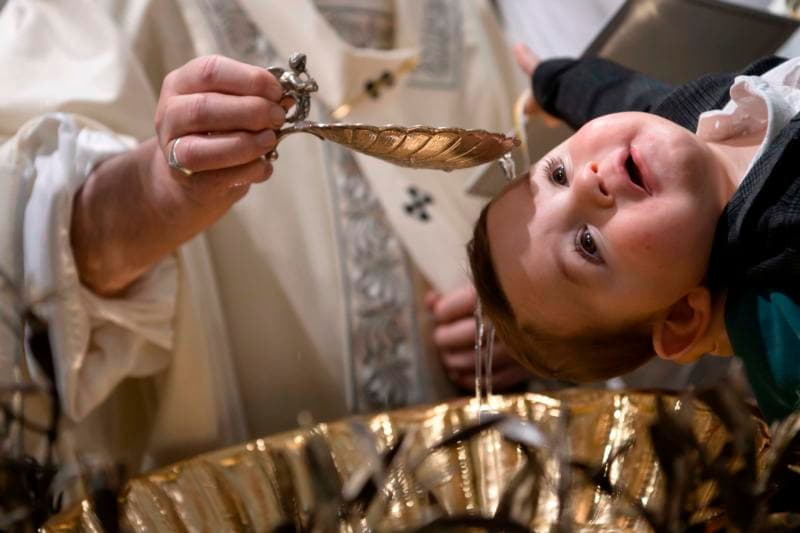ROME – On Thursday, the Vatican issued a response to a question about the validity of baptisms using a modified formula, insisting that any baptism celebrated with a formula other than the one approved and in the Church’s liturgical books are invalid.
Specifically, the question was whether baptisms conferred with the formula, “We baptize you in the name of the Father and of the Son and of the Holy Spirit,” rather than the traditional, “I baptize you…,” are valid, and whether persons baptized with the modified formula must be baptized in forma absoluta, meaning, that the person should be considered unbaptized, as opposed to “doubtfully” baptized.
In its response, the Vatican Congregation for the Doctrine of the Faith ruled that baptisms using the modified formula were invalid, and thus that people who received the sacrament with that formula must be baptized using the regular one.
In a doctrinal note accompanying the response the congregation noted that it has received a number of cases in which baptisms have been administered using the words: “In the name of the father and of the mother, of the godfather and of the godmother, of the grandparents, of the family members, of the friends, in the name of the community we baptize you in the name of the Father and of the Son and of the Holy Spirit.”
Signed on the June 24 Solemnity of Saint John the Baptist by Cardinal Luis Ladaria, head of the Vatican’s doctrinal office, and by the department’s secretary, Archbishop Giacomo Morandi, the note said the apparent reason for the modification of the regular formula was “to express the participation of the family and of those present, and to avoid the idea of the concentration of a sacred power in the priest to the detriment of the parents and the community.”
The congregation did not specify where these modifications were taking place, but insisted that the “debatable pastoral motives” behind the changes point to an “ancient temptation to substitute for the formula handed down by Tradition other texts judged more suitable.”
St. Thomas Aquinas, it said, had already ruled out the possibility of several people baptizing an individual at the same time.
Quoting the Second Vatican Council constitution on liturgy, Sacrosanctum Concilium, the note said that “when a man baptizes it is really Christ Himself who baptizes.”
“When celebrating a Sacrament, the Church in fact functions as the Body that acts inseparably from its Head, since it is Christ the Head who acts in the ecclesial Body generated by him in the Paschal mystery,” it said, insisting that in both Vatican II and the Council of Trent, it was determined that “they do not have the authority to subject the seven sacraments to the action of the Church.”
“The Sacraments, in fact, inasmuch as they were instituted by Jesus Christ, are entrusted to the Church to be preserved by her,” the note said.
Quoting another passage from Sacrosanctum Concilium, the congregation stressed that “no one ‘even if he be a priest, may add, remove, or change anything in the liturgy on his own authority.’”
To modify the sacramental formula on one’s own initiative “does not constitute simply a liturgical abuse, like the transgression of a positive norm, but a vulnus (wound) inflicted upon the ecclesial communion and the identifiability of Christ’s action,” it said.
“No group can make itself Church, but becomes Church in virtue of a call that cannot arise from within the assembly itself,” it said, insisting that the minister is therefore a visible sign of the presence of Christ and a sign that the sacrament “is not subject to an arbitrary action of individuals or of the community, and that it pertains to the Universal Church.”
Even if the minister has the intention to do what the Church wishes, this intention “cannot remain only at the interior level, with the risk of subjective distractions,” but must be expressed in the minister’s actions.
In the case of baptism, the congregation stressed that not only does the minister lack the authority to modify the sacramental formula “to his own liking,” but he is also unable to declare that he is acting on behalf of others involved, such as the parents, godparents, friends or relatives.
When the minister recites the words, “I baptize you…,” the note said, “he does not speak as a functionary who carries out a role entrusted to him,” but through his ministry signals the presence of Christ, “who acts in his Body to give his grace.”
To modify the sacramental formula, the congregation said, “implies a lack of an understanding of the very nature of the ecclesial ministry that is always at the service of God and his people and not the exercise of a power that goes so far as to manipulate what has been entrusted to the Church in an act that pertains to the tradition.”
This is not the first time the Vatican’s doctrine office has made a ruling about sticking to the traditional baptismal formula.
In 2012, the congregation ruled that a baptism administered “in the name of the Creator, and of the Redeemer and of the Sanctifier” was invalid. The formula had apparently been developed in order to avoid referring to the Trinity with masculine names.
Follow Elise Ann Allen on Twitter: @eliseannallen














